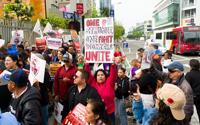
(Photo by Mauro Romero on Unsplash)
The Los Angeles City Council Wednesday instructed the City Attorney's Office to draft a policy that would extend protections under the existing Fair Work Week Ordinance for fast food employees -- taking what supporters described as a significant step in providing such workers with stable scheduling and paid time off, among other benefits.
In a unanimous vote, the council approved a motion introduced by members Hugo Soto-Martinez, Katy Yaroslavsky and Curren Price last summer to address ongoing issues in the fast food industry.
If approved, a final ordinance would also mandate a six-hour paid training period to educate fast food workers on their rights.
Additionally, city staff were requested to report on ways to increase compliance, to estimate costs, and to analyze other jurisdictions such as New York, Seattle and Oregon where similar policies are in place.
City staff will also gather feedback from L.A.'s small business community, including but not limited to the Small Business Commission, Los Angeles Chamber of Commerce, quick-service restaurants and other interested organizations. They will also report on the current state of the fast food industry in the aftermath of January's wildfires.
While the motion moved forward, several council members requested additional reports on the economic impact such a policy could have on the city at a time when Los Angeles is facing a $1 billion deficit in the next fiscal year.
Council members Bob Blumenfield, John Lee and Monica Rodriguez called for more studies.
Blumenfield noted that several restaurants and businesses are closing in L.A. His intention was not to slow down the policy, but to make sure they were "eyes wide open" as they move forward, he said.
"There's no harm, no foul in just getting back data as we look to how we proceed forward in policy making," Rodriguez added.
The council members were raising concerns made by a coalition of restaurant owners, business groups and fast-food brands who argue the proposal could drive up food costs and threaten the viability of local food establishments in the city.
Soto-Martinez challenged his colleagues' requests, saying that it will only further delay protections for fast food workers and cost the city more money. He also argued that these reports already exist -- some published by outside entities and other studies done as part of the work for the 2022 Fair Work Week Ordinance.
Price agreed.
"This measure is about expanding the Fair Work Week. It doesn't increase wages. We have studied the impact before and I think that research is still valid and vital," he said.
Councilwoman Ysabel Jurado said Wednesday's vote was "not about short- term jobs with little pay and little protections. It's about good jobs for the long term to make our city stable, which (it) isn't at this time."
The Fair Work Week Ordinance requires large retail businesses with more than 300 workers to provide stable and predictable schedules, additional opportunities to work and other employment protections.
If the policy is expanded, it would cover more than 2,500 large-chain fast-food restaurants and about 50,000 workers.
A recent report published by the Workplace Justice Lab at Rutgers University and Northwestern University found that one in four fast food workers were paid below the minimum wage in 2024, meaning employers paid out less for hours worked, refused to provide overtime pay or required employees to do off- the-clock work.
A significant amount of fast-food workers experienced wage theft -- much more compared to other major industries in Los Angeles such as health-care support, retail and transportation, the study said.
Additionally, the report said Los Angeles fast-food workers lose almost $3,500 a year or 16% of their income because employers pay them below the minimum wage. In the last six years, that amounts to more than a quarter of a billion dollars, according to researchers.
With more than 557,000 workers across more than 30,000 locations, California's fast-food industry is one of the state's largest and fastest growing low-wage sectors.
Last year, AB 1228 went into effect, boosting fast-food workers' earnings from the state's minimum wage of $16 per hour to $20 per hour. The law also established a Fast Food Council made up of nine voting members, consisting of the fast-food industry, franchisees, employees, advocates, one unaffiliated member of the public and two non-voting members, who will provide direction and coordinate with state powers to ensure the health, safety and employment of fast-food workers.
A significant majority of fast-food employees - approximately 60 percent - identify as Latina/Latino, underscoring the potential impact of the changes on this particular demographic.
The implementation of a new law in California was a result of years of tireless advocacy by various organizations, including The Fast Food Workers Union and members of the Fight for Fifteen Campaign.
Additional reporting by Michelle Zacarias and City News Service.











(0) comments
Welcome to the discussion.
Log In
Keep it Clean. Please avoid obscene, vulgar, lewd, racist or sexually-oriented language.
PLEASE TURN OFF YOUR CAPS LOCK.
Don't Threaten. Threats of harming another person will not be tolerated.
Be Truthful. Don't knowingly lie about anyone or anything.
Be Nice. No racism, sexism or any sort of -ism that is degrading to another person.
Be Proactive. Use the 'Report' link on each comment to let us know of abusive posts.
Share with Us. We'd love to hear eyewitness accounts, the history behind an article.